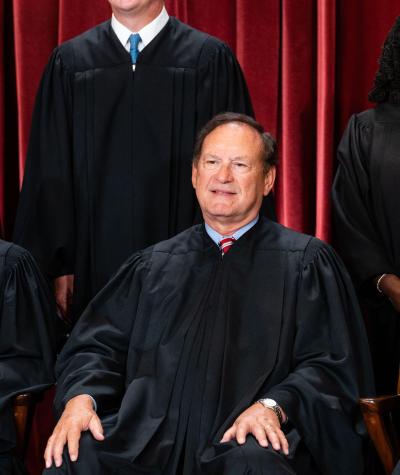Yet another troubling example of why the Supreme Court needs stronger ethics rules and an internal enforcement mechanism for handling ethical violations has surfaced — this time by way of unreported travel gifts given to Justice Samuel Alito.
In an extremely unusual move, Justice Alito published an op-ed to rebuff and get in front of the allegations, which raises more questions than answers. If the Court had ethics officials responsible for interpreting ethics rules, the public would have clarity on whether Justice Alito’s conduct was wrong, making the reporting and the op-ed unnecessary to begin with.
In 2008, Justice Alito went on a trip to Alaska. He traveled via private jet that may have cost more than $100,000 one-way, paid for by a billionaire who has regular business before the Supreme Court — his hedge fund has appeared before the Court at least 10 times since the trip, and had petitioned the court one year prior to it. Another individual, the owner of a luxury fishing lodge, provided Justice Alito with his free stay, which would usually cost more than $1,000 per night.
The reason we are learning about this trip 15 years after the fact is because Justice Alito did not report the fishing trip in his annual financial disclosure report, even though he was required to under the Ethics in Government Act (EIGA). Failing to report travel gifts is a violation of that law, one that has recently landed Justice Clarence Thomas in the news. Justice Thomas’s apparently willful failure to report private jet travel was also the basis for a letter Campaign Legal Center sent to the Judicial Conference asking the body to refer him to the Department of Justice.
In his response to this new reporting, Justice Alito excused not reporting traveling on the private jet because the seat in the jet would have otherwise remained vacant, so his travel did not “impose any extra cost” for the billionaire. However, EIGA does not provide a “vacant seat” exception to reporting private jet travel.
Beyond not reporting travel gifts, the trip he took may not even fall under the personal hospitality exemption. Under this exemption, gifts to stay at someone’s personal property do not have to be reported, but justices must report when a friend pays for them to stay at a commercial property, like the lodge where Justice Alito stayed.
Justice Alito’s explanation includes a description of his accommodations as “a modest one-room unit.” But there is no “modesty” exception for reporting. Although stays at commercial properties are not considered personal hospitality for all other public officials under federal law, it is unclear how justices were advised about how the law applies to them.
At the very least, if Justice Alito had reported the travel gift he received to fly on the private jet, it would have revealed who paid for the flight, and when the cases involving the jet owner’s hedge fund came before the Court, it would have provided the public an opportunity to ask for an explanation for recusal.
It is critical for the public’s trust in our democratic institutions that the Supreme Court is held to the highest ethical standards. But the lack of transparency and accountability surrounding this trip highlights exactly why public faith and confidence in the Supreme Court is so low. Stronger ethics rules and an internal ethics office that provides consistent and clear ethics advice could prevent these questions about what is legally required and improve public trust.
Instead, Supreme Court justices continue to take trips and accept gifts that would violate ethics laws in the other two branches of government and raise questions about whether the justices are acting impartially and on behalf of the public they were appointed to serve, or in their own personal interests.

